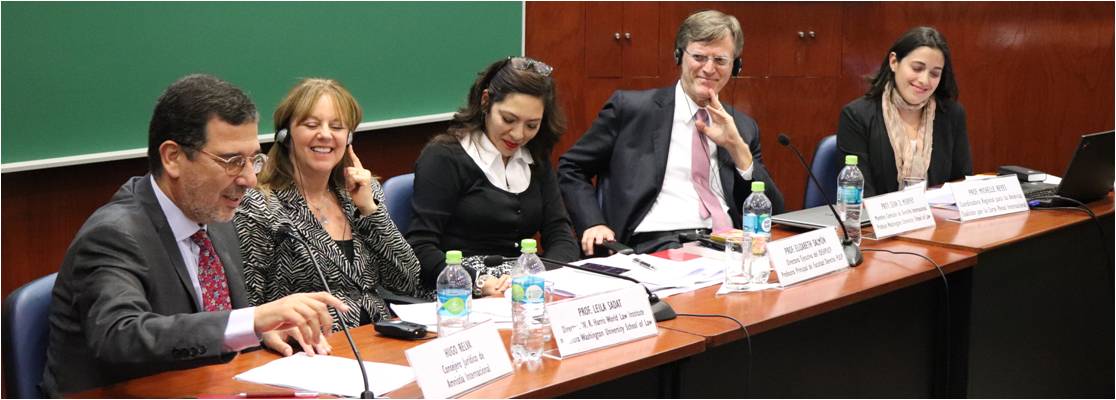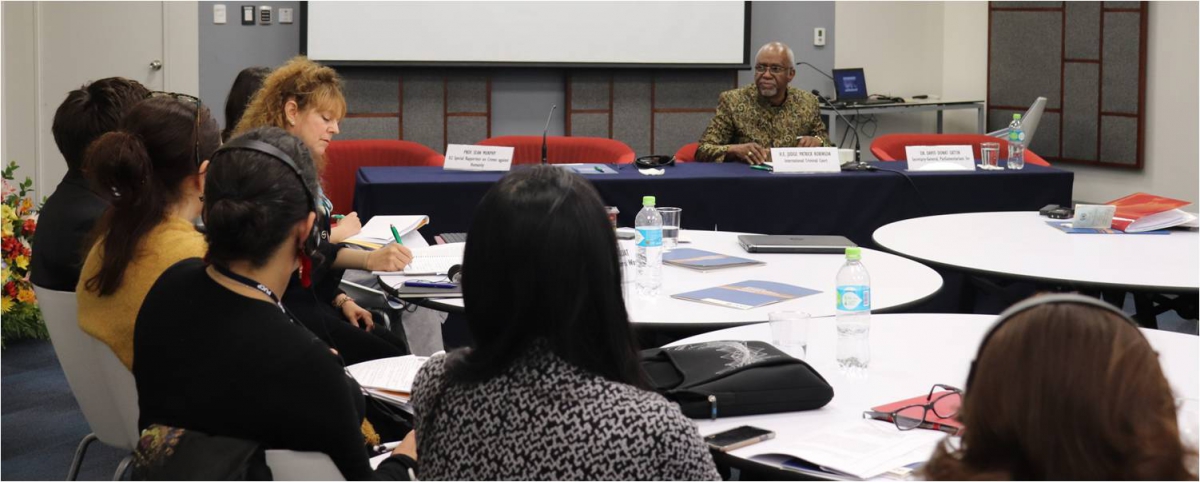[Originally published by the Coalition for the International Criminal Court.]

On 27-28 September 2018, the Coalition for the International Criminal Court (CICC), the Institute of Democracy and Human Rights of PUCP (IDEHPUCP), the Master’s Program on Human Rights of PUCP and the School of Law of the Washington University in St. Louis organized two events on the Draft Convention for the Prevention and Punishment of Crimes against Humanity: A public event at PUCP, and a regional expert workshop. The two events were hosted by the Pontifical Catholic University of Peru (PUCP) in Lima.
PUBLIC EVENT ON THE INTERNATIONAL LAW COMMISSION AND THE DRAFT CONVENTION FOR THE PREVENTION AND PUNISHMENT OF CRIMES AGAINST HUMANITY
The event on September 27, open to the public, brought together Sean Murphy, Special Rapporteur on Crimes Against Humanity of the International Law Commission, Leila Sadat, Director of the Whitney R. Harris World Law Institute at the University of Washington in St. Louis and current Special Adviser in CLH at the Office of the Prosecutor of the ICC, and Hugo Relva, Legal Advisor for Amnesty International (International Secretariat), who discussed some of the most important aspects of the draft Convention, including the drafting process and its articles. Elizabeth Salmón, Director of IDEHPUCP and Professor of International Law at PUCP, and Michelle Reyes, Regional Coordinator for the Americas for the CICC, moderated the conference.

The workshop sought to provide an opportunity for interested individuals from the American and Caribbean region to participate together with the Special Rapporteur in the discussion on the work of the International Law Commission (ILC) on this issue, and learn about the development of the proposal, as well as provide specific comments to the text of the draft articles.
Welcoming remarks were made by Dr. Salmón, who spoke about the relationship of Peru with crimes against humanity (CAH) and the role of the Inter-American Court of Human Rights (Court of Human Rights) in the analysis and case-law contributions to this category. Following these remarks, Mr. Christoph Sommer, Deputy Head of Mission of the Embassy of Switzerland, welcomed participants to the workshop, and highlighted the importance of the draft treaty.
Professor Leila Sadat gave the first presentation, titled “Concept, current normative framework and background of the Project of the Convention for the Prevention and Sanction of the CAH”, where she stressed that to this date, there is no treaty focusing specifically on CAH. While the Rome Statute (RS) contains an article on CAH (article 7), Prof. Sadat recalled that the ICC has jurisdiction in certain cases, and it is the States that have the primary responsibility to investigate, punish and prevent these crimes
In the second presentation, “The Draft Convention for the Prevention and Punishment of the CAH of the International Law Commission,” Professor Murphy asked how we should address the severe crimes contained in the draft convention, and acknowledged that we must think about how to encourage courts, national institutions, and States to refocus their work on the punishment and prosecution of CAH. He also stressed that half of the world does not have legislation on these crimes, and many States have not incorporated them into domestic legislation because they are not part of any treaty that obliges them to do so. Even several States that are party to the Rome Statute do not have provisions on CAH because there is no express obligation to implement them, despite the principle of complementarity. After a brief review of the origins of the CAH Convention project, he described the main scope of its content.
Hugo Relva, in charge of giving the third presentation entitled “Pending Issues in the Draft Convention and Future Challenges”, stated that the Draft Convention should reflect the highest standards in International Law, and that its purpose is to enshrine these standards so that it can prevent and repress CAH in the future. He also highlighted some important aspects of the Preamble, and highlighted some aspects of the draft Convention that could be improved, as well as some elements that should be included, such as a provision that refers to the principle of legality, a clause of civil remedies, the prohibition of reservations, a norm on the territorial extension, a clear prohibition on amnesties, a prohibition on the jurisdiction of military courts for the investigations of these crimes, among other.
The final observations were made by Michelle Reyes Milk, who highlighted that the Draft Convention on CAH is a fundamental piece in the development of International Law, and recognized the relevance of this treaty for Peru and for the Latin American region. However, she clarified that there are several pending issues, such as the implementation of provisions on crimes against humanity within domestic legislation, or the pending review of existing domestic provisions that do not fully reflect the elements or crimes within article 7 of the Rome Statute. In this sense, the Convention constitutes the missing piece in the Rome Statute system, including with regards to national mechanisms.

Finally, she highlighted some provisions that are included on the Draft Convention on which there are no express obligations in the Rome Statute: the explicit obligation to implement, the importance of prevention, the liability of legal persons, and universal jurisdiction.
REGIONAL EXPERT WORKSHOP
In the framework of this meeting, on September 28, a Regional Expert Workshop was also held to discuss the text of the draft Convention. It was a closed workshop with the participation of several representatives of Latin American civil society and members of the Coalition, including Dr. David Donat Cattin, General Secretary of Parliamentarians for Global Action, Hugo Relva, Legal Counsel of Amnesty International, Adriana Benjumea, Director of the HUMANAS Corporation, José Carlos Ospina, Legal Advisor of the Colombian Commission of Jurists, José Antonio Guevara, Executive Director of the Mexican Commission for the Defense and Promotion of Human Rights, Gloria Cano, Executive Director of APRODEH , among other experts from the region, who debated and suggested changes and improvements to the project.

One of the most important issues was the relationship between CAH and the figure of amnesties and pardons. In this regard, the experts expressed their concern about the absence of an article on this topic, and suggested the inclusion of an express prohibition of amnesties for this type of crimes. Another very debated issue at the meeting was the regulation on command responsibility, in draft article 6.
The modes of reparations were also discussed, in order to collect “non-repetition” measures, not only as a form of reparation, but as a form of prevention. Thus, the regulation of the prevention of these crimes was recognized as one of the great strengths of the draft convention.
The question of how these issues should be incorporated domestic legislation led the debate to the issue of implementation, and the fact that the draft convention stipulates an express obligation to make these obligations effective was highlighted. Some references to interpretations of the principle of legality were also mentioned.

Towards the end of the debate, the importance of the right to truth as a form of reparation was highlighted, given that it is an opportunity to reaffirm that this is a right with implications in this treaty.The Latin American perspective was recognized during the discussions, among other things by the approach of vulnerable groups: the need to include a gender approach holistically throughout the treaty, in addition to other situations such as the case of women living in poverty, indigenous people, people of African descent who are victims of these crimes, inter alia.
Click here to find additional information or a complete summary of the public event in Spanish.